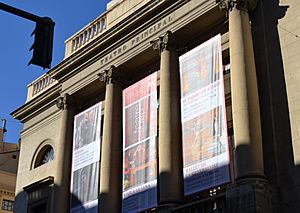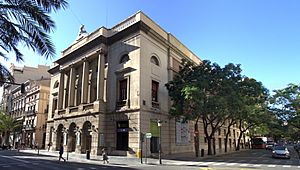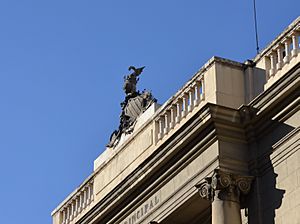Teatro Principal de València facts for kids
The Teatro Principal de València (which means Main Theatre of València) is a famous theatre in Valencia, Spain. You can find it right in the city center on a street called Carrer de les Barques (Boats Street). It's very close to important places like the City Hall, the Northern Train Station, and the Bullring.
Contents
What is the Teatro Principal?
The Teatro Principal is the oldest theatre still standing in Valencia. It was built even before other famous Spanish theatres like Madrid's Teatro Real and Barcelona's Liceu. Before this theatre, Valencia had another main theatre called the Corral de las Comedias de la Olivera. That theatre was torn down because plays were banned for a while. But in 1760, King Charles III said plays could happen again. So, in 1774, people decided to build a new main theatre.
How was the Teatro Principal built?
The first design for the building was made by Filippo Fontana. However, building work didn't start until January 1808, many years after Fontana had died. The new plans were based on his ideas but redesigned by Cristóbal Sales.
Building stopped the next year because of the Peninsular War. Work didn't start again even after the war ended in 1814. For a while, the unfinished building was even used for cockfights!
Building suddenly began again in 1831. This time, architect Juan Marzo redesigned the plans. He changed it from a four-story building to a three-story one. The theatre was built quickly and opened on July 24, 1832. The first show included part of an opera called La Cenerentola.
The inside of the theatre was updated in 1845 by Sebastián Monleón. He also designed Valencia's bullring later on. The front of the building (the facade) was added in 1854 by José Zacarías.
What is the Teatro Principal used for?

The Teatro Principal has been used for many different kinds of performances over the years.
Opera and Zarzuela Performances
Many important operas and zarzuelas (a Spanish type of musical play) had their first performances here. For example, El gato montés by Manuel Penella and La venta de los gatos by José Serrano were first shown at the Principal.
In 1987, the Valencia Orchestra moved to the Palau de la Música. But the Principal still remained the main place for staged operas until the Palau de les Arts opened in 2005. Even though the orchestra mostly played opera as concert music at the Palau de la Música, they came back to the Teatro Principal for new local operas. One example is Amando Blanquer's El triomf de Tirant in 1992.
Orchestral Music Concerts
The Valencia Orchestra often played at the Teatro Principal after it started in 1943. This was because Valencia didn't have a special concert hall. Most touring orchestras would play in Llíria, a town about 25 km away. When the Palau de la Música opened in 1987, the orchestra moved there.
In July 2019, the Palau de la Música had to close temporarily. Part of its ceiling fell down. Repairs took a long time, so the Principal became the main place for the Valencia Orchestra again.
Piano Music Events
The famous composer Franz Liszt gave three concerts at the Teatro Principal in March 1845. He was on a world tour to help raise money for a statue of Ludwig van Beethoven in Germany.
The José Iturbi Piano Prize competition started at the Principal in 1981. Thirteen competitions were held there until it moved to the Palau de la Música in 2004. When the Palau de la Música closed temporarily, the competition returned to the Principal for its 2021 event.
Pop-Rock Concerts
The concert that helped launch the career of the famous Spanish singer Nino Bravo took place at the Teatro Principal in March 1969.
See also
 In Spanish: Teatro Principal (Valencia) para niños
In Spanish: Teatro Principal (Valencia) para niños
 | William L. Dawson |
 | W. E. B. Du Bois |
 | Harry Belafonte |



